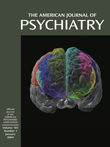To the Editor: Disturbances in interpersonal relationships help define posttraumatic stress disorder (PTSD). The DSM-IV criteria for PTSD include a “feeling of detachment or estrangement from others” and “restricted range of affect (e.g., unable to have loving feelings).” Combat-related PTSD has been reported to lead to psychiatric disturbances in veterans’ families
(1).
Treatments for PTSD are usually not curative. Pharmacotherapy for PTSD typically does not entirely eradicate symptoms, even in trials generally reporting significant benefits, and combat PTSD may be more refractory to pharmacotherapy than noncombat PTSD
(2). Improvements from psychotherapy may also be modest
(3).
Given these interpersonal and treatment issues, I have been heartened to witness improvements in PTSD among Vietnam veterans who become caregivers for their grandchildren. These veterans have reported improved mood, less ruminative thinking about Vietnam experiences, and less isolation and suicidality. Of interest, a PUBMED search for articles about PTSD and grandchildren produced no articles dealing with combat veterans.
Why would caring for grandchildren be helpful to combat veterans? Child care may be an effective distraction from ruminative thinking because it is so demanding. One veteran, thinking of his boisterous grandson, said, “Any man who has to take care of that kid has to give up his PTSD.” One veteran stated that “the laughter” of his grandchildren is helpful, while another indicated that knowing that his grandson would miss him prevents him from killing himself. This otherwise extremely isolative veteran ventures to baseball games with this grandson. Veterans also report that young children are unconditionally accepting and nonjudgmental, counteracting their sense of personal guilt and of being judged by society as “baby killers.”
Although these veterans are showing improvement, it is not known how the grandchildren are faring. A study of Nazi Holocaust survivors’ grandchildren suggesting an increase in behavioral disturbances among these children raises concerns
(4). Are the ill effects of combat PTSD being handed down to the third generation? If so, are there interventions that might prevent this? What particular aspects of the relationship with grandchildren (e.g., distraction, altruistic mission, acceptance) yield improvements, and how should this inform our treatment of PTSD? Should assuming certain caregiving roles be encouraged by PTSD therapies? Because of the potential benefits to veterans and the uncertain effects on grandchildren, I believe that there is urgent need for careful study of the caregiver veteran-grandchild relationship.

